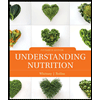
Campbell Biology in Focus (2nd Edition)
2nd Edition
ISBN: 9780321962751
Author: Lisa A. Urry, Michael L. Cain, Steven A. Wasserman, Peter V. Minorsky, Jane B. Reece
Publisher: PEARSON
expand_more
expand_more
format_list_bulleted
Concept explainers
Textbook Question
Chapter 30, Problem 11TYU
SCIENTIFIC INQUIRY
Critics of GM foods have argued that foreign genes may disturb normal cellular functioning, causing unexpected and potentially harmful substances to appear inside cells. Toxic intermediary substances that normally occur in very small amounts may arise in larger amounts, or new substances may appear. The disruption may also lead to loss of substances that help maintain normal
Expert Solution & Answer
Want to see the full answer?
Check out a sample textbook solution
Students have asked these similar questions
what did charles darwin do in science
evolutionary analysis
Can I get this answered with the colors and what type of connection was formed? Hydrophobic, ionic, or hydrogen.
Chapter 30 Solutions
Campbell Biology in Focus (2nd Edition)
Ch. 30.1 - WHAT IF? If flowers had shorter styles, pollen...Ch. 30.1 - WHAT IF? In some species, sepals look like petals,...Ch. 30.1 - Prob. 3CCCh. 30.2 - Prob. 1CCCh. 30.2 - Prob. 2CCCh. 30.2 - Self-fertilization, or selfing, seems to have...Ch. 30.3 - Prob. 1CCCh. 30.3 - Why does Bt maize have less fumonisin than non-GM...Ch. 30.3 - WHAT IF? In a few species, chloroplast genes are...Ch. 30 - A seed develops from an A. ovum B. embryo. C....
Ch. 30 - A fruit is a A. mature ovary. B. B . mature ovule....Ch. 30 - Double fertilization means that A. flowers must be...Ch. 30 - Golden Rice A. is resistant to various herbicides,...Ch. 30 - Which statement concerning grafting is correct? A....Ch. 30 - Some dioecious species have the XY genotype for...Ch. 30 - A small flower with green petals is most likely A....Ch. 30 - The pollen produced by wind-pollinated plants is...Ch. 30 - The black dots that cover strawberries are...Ch. 30 - DRAW IT Draw a flower and label the parts.Ch. 30 - SCIENTIFIC INQUIRY Critics of GM foods have argued...Ch. 30 - SCIENCE, TECHNOLOGY, AND SOCIETY People have...Ch. 30 - FOCUS ON EVOLUTION With respect to sexual...Ch. 30 - FOCUS ON ORGANIZATION In a short essay (100-150...Ch. 30 - SYNTHESIZE YOUR KNOWLEDGE This colorized SEM shows...
Additional Science Textbook Solutions
Find more solutions based on key concepts
An aluminum calorimeter with a mass of 100 g contains 250 g of water. The calorimeter and water are in thermal ...
Physics for Scientists and Engineers
Q2. Which statement best defines chemistry?
a. The science that studies solvents, drugs, and insecticides
b. Th...
Introductory Chemistry (6th Edition)
Why do scientists think that all forms of life on earth have a common origin?
Genetics: From Genes to Genomes
Gregor Mendel never saw a gene, yet he concluded that some inherited factors were responsible for the patterns ...
Campbell Essential Biology (7th Edition)
Knowledge Booster
Learn more about
Need a deep-dive on the concept behind this application? Look no further. Learn more about this topic, biology and related others by exploring similar questions and additional content below.Similar questions
- Can I please get this answered with the colors and how the R group is suppose to be set up. Thanksarrow_forwardfa How many different gametes, f₂ phenotypes and f₂ genotypes can potentially be produced from individuals of the following genotypes? 1) AaBb i) AaBB 11) AABSC- AA Bb Cc Dd EE Cal bsm nortubaarrow_forwardC MasteringHealth MasteringNu × session.healthandnutrition-mastering.pearson.com/myct/itemView?assignment ProblemID=17396416&attemptNo=1&offset=prevarrow_forward10. Your instructor will give you 2 amino acids during the activity session (video 2-7. A. First color all the polar and non-polar covalent bonds in the R groups of your 2 amino acids using the same colors as in #7. Do not color the bonds in the backbone of each amino acid. B. Next, color where all the hydrogen bonds, hydrophobic interactions and ionic bonds could occur in the R group of each amino acid. Use the same colors as in #7. Do not color the bonds in the backbone of each amino acid. C. Position the two amino acids on the page below in an orientation where the two R groups could bond together. Once you are satisfied, staple or tape the amino acids in place and label the bond that you formed between the two R groups. - Polar covalent Bond - Red - Non polar Covalent boND- yellow - Ionic BonD - PINK Hydrogen Bonn - Purple Hydrophobic interaction-green O=C-N H I. H HO H =O CH2 C-C-N HICK H HO H CH2 OH H₂N C = Oarrow_forwardFind the dental formula and enter it in the following format: I3/3 C1/1 P4/4 M2/3 = 42 (this is not the correct number, just the correct format) Please be aware: the upper jaw is intact (all teeth are present). The bottom jaw/mandible is not intact. The front teeth should include 6 total rectangular teeth (3 on each side) and 2 total large triangular teeth (1 on each side).arrow_forward12. Calculate the area of a circle which has a radius of 1200 μm. Give your answer in mm² in scientific notation with the correct number of significant figures.arrow_forwardDescribe the image quality of the B.megaterium at 1000X before adding oil? What does adding oil do to the quality of the image?arrow_forwardWhich of the follwowing cells from this lab do you expect to have a nucleus and why or why not? Ceratium, Bacillus megaterium and Cheek epithelial cells?arrow_forward14. If you determine there to be debris on your ocular lens, explain what is the best way to clean it off without damaging the lens?arrow_forward11. Write a simple formula for converting mm to μm when the number of mm's is known. Use the variable X to represent the number of mm's in your formula.arrow_forward13. When a smear containing cells is dried, the cells shrink due to the loss of water. What technique could you use to visualize and measure living cells without heat-fixing them? Hint: you did this technique in part I.arrow_forward10. Write a simple formula for converting μm to mm when the number of μm's are known. Use the variable X to represent the number of um's in your formula.arrow_forwardarrow_back_iosSEE MORE QUESTIONSarrow_forward_ios
Recommended textbooks for you
 Understanding Nutrition (MindTap Course List)Health & NutritionISBN:9781337392693Author:Eleanor Noss Whitney, Sharon Rady RolfesPublisher:Cengage Learning
Understanding Nutrition (MindTap Course List)Health & NutritionISBN:9781337392693Author:Eleanor Noss Whitney, Sharon Rady RolfesPublisher:Cengage Learning Human Heredity: Principles and Issues (MindTap Co...BiologyISBN:9781305251052Author:Michael CummingsPublisher:Cengage Learning
Human Heredity: Principles and Issues (MindTap Co...BiologyISBN:9781305251052Author:Michael CummingsPublisher:Cengage Learning Biology: The Dynamic Science (MindTap Course List)BiologyISBN:9781305389892Author:Peter J. Russell, Paul E. Hertz, Beverly McMillanPublisher:Cengage Learning
Biology: The Dynamic Science (MindTap Course List)BiologyISBN:9781305389892Author:Peter J. Russell, Paul E. Hertz, Beverly McMillanPublisher:Cengage Learning Concepts of BiologyBiologyISBN:9781938168116Author:Samantha Fowler, Rebecca Roush, James WisePublisher:OpenStax College
Concepts of BiologyBiologyISBN:9781938168116Author:Samantha Fowler, Rebecca Roush, James WisePublisher:OpenStax College Nutrition: Concepts and Controversies - Standalo...Health & NutritionISBN:9781305627994Author:Frances Sizer, Ellie WhitneyPublisher:Brooks Cole
Nutrition: Concepts and Controversies - Standalo...Health & NutritionISBN:9781305627994Author:Frances Sizer, Ellie WhitneyPublisher:Brooks Cole

Understanding Nutrition (MindTap Course List)
Health & Nutrition
ISBN:9781337392693
Author:Eleanor Noss Whitney, Sharon Rady Rolfes
Publisher:Cengage Learning

Human Heredity: Principles and Issues (MindTap Co...
Biology
ISBN:9781305251052
Author:Michael Cummings
Publisher:Cengage Learning

Biology: The Dynamic Science (MindTap Course List)
Biology
ISBN:9781305389892
Author:Peter J. Russell, Paul E. Hertz, Beverly McMillan
Publisher:Cengage Learning

Concepts of Biology
Biology
ISBN:9781938168116
Author:Samantha Fowler, Rebecca Roush, James Wise
Publisher:OpenStax College

Nutrition: Concepts and Controversies - Standalo...
Health & Nutrition
ISBN:9781305627994
Author:Frances Sizer, Ellie Whitney
Publisher:Brooks Cole

Nitrogen emissions: environmental and health hazards; Author: Sandec Eawag;https://www.youtube.com/watch?v=iYcchHZ5Ejo;License: Standard Youtube License